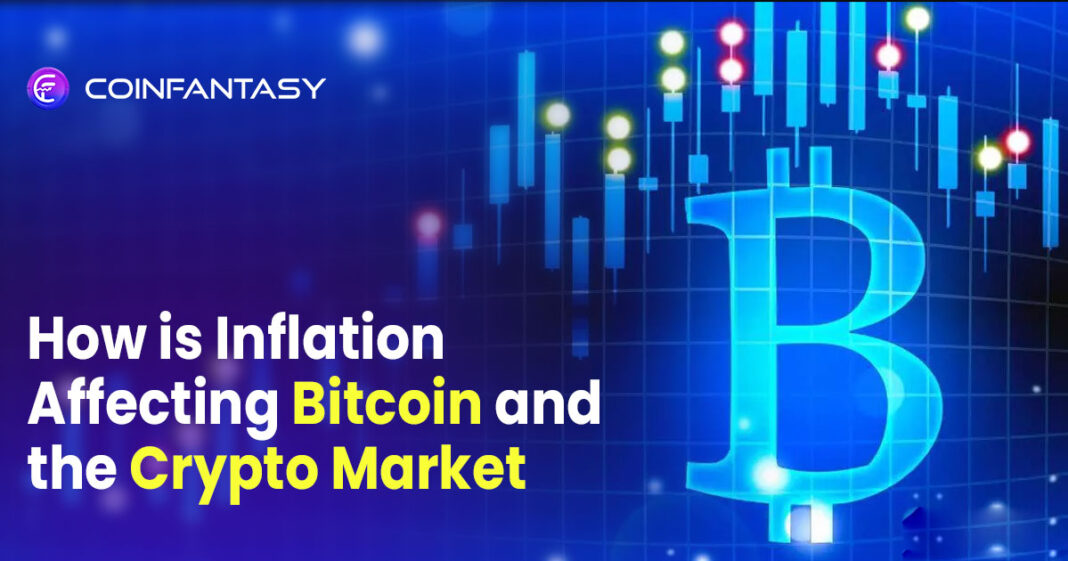According to Cory Klippsten, CEO of Swan.com, “I anticipate we will continue to see credit contagion expand as we learn who has exposure to both FTX and Alameda.”
Cryptocurrencies: Are they Subject to Inflation?
Even Bitcoin, frequently seen as “inflation-resistant,” experiences inflation. Bitcoin undergoes inflation when more of it is mined, much like gold. However, because the cost of mining new Bitcoin is automatically cut by 50% every four years, inflation rates will eventually fall.
Investors typically don’t give much thought to Bitcoin’s average annual inflation rates as long as its value is still increasing relative to fiat currencies. However, the performance of other cryptocurrencies can vary.
How does Bitcoin Lead to Higher Inflation?
Cryptocurrency has prominently matched market trends thanks in large part to institutional investors. This implies that Bitcoin (World’s first cryptocurrency) will probably decrease.
As a result, the Federal Reserve will probably implement a dual mandate when inflationary news arises. There will be a rise in policy rates and a tightening of the financial ecosystem.
Since reaching its peak in November 2021, Bitcoin has dropped by over 75%. Similar to Bitcoin, Ethereum, the second-largest cryptocurrency, has fallen. ETH was down 0.19% on 26th Jan, according to CoinMarketCap, trading at $1,597.85.
GlobalData thematic research indicates that the present low crypto market is likely to last as long as inflation keeps increasing. “People’s disposable income is low due to inflation and rising living expenses, which leaves them with less money to invest in crypto industry.”
Bitcoin appears to be an inflation hedge based on fundamental and technical considerations. However, the persistence of a bear market’s instability and its connection to traditional markets refute this notion.
As Jerome Powell, the head of the U.S. Federal Reserve, announced earlier this year that interest rate hikes would slow starting in December, the market anticipates a decrease in interest rates.
If the announcement of an interest rate hike is less significant than previous ones, the cryptocurrency market could experience a relief rally.
Deflationary cryptocurrencies have a declining coin supply over time. This implies that each coin’s value should increase as there is a steady market. Consider Ethereum. Ether, the native token, continues to be an inflationary coin. However, a change made in 2021 caused some ethers to be destroyed as network activity increased. It is anticipated that Ethereum will eventually be non-inflationary or even deflationary after switching to proof-of-stake consensus.
Does Bitcoin Cause Inflation or Deflation?
Currently, inflation is caused by bitcoin. As more bitcoin is mined, the overall supply grows. The number of bitcoins available is also hard-capped at 21 million. The current algorithm predicts that this threshold won’t be met until 2140 though.
Following the Mining of All 21 Million Tokens, What Next to Bitcoin?
No new bitcoin will be created after then, according to the present algorithm. As long as they can still obtain transaction fees, bitcoin miners may still be motivated to produce blocks.
However, if forecasters are accurate and the U.S. economy is doomed to enter a new recession as early as next year, the crypto market may have a completely different outcome this time. According to several analysts, the success of the largest cryptocurrency will probably be influenced by what happens in broader markets because of bitcoin’s recent strong correlation to U.S. stocks.
Final Note
Bitcoin is deflationary, in contrast to how the term “inflation” is typically used in economics because its value grows with time. Since there is currently no trading history for cryptocurrencies during periods of inflation, it is impossible to predict how prices would change as a result of inflation. However, based on the performance of other asset classes in a comparable situation, investors can make some forecasts.
Although it is anticipated that over time, Bitcoin’s purchasing power will settle, it is now incredibly volatile. Given that the total supply of Bitcoin is fixed, if demand keeps rising, its purchasing power will gradually increase.

